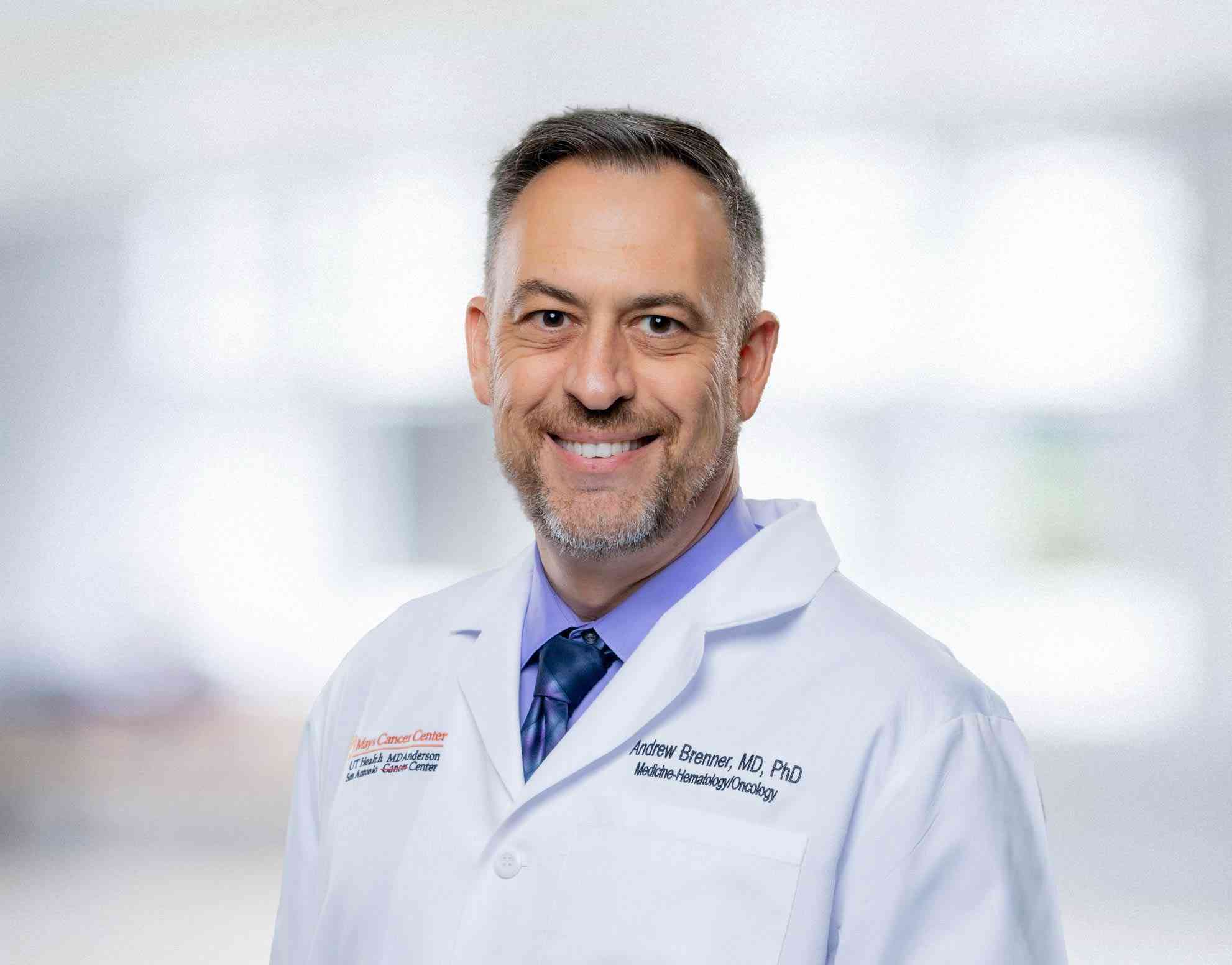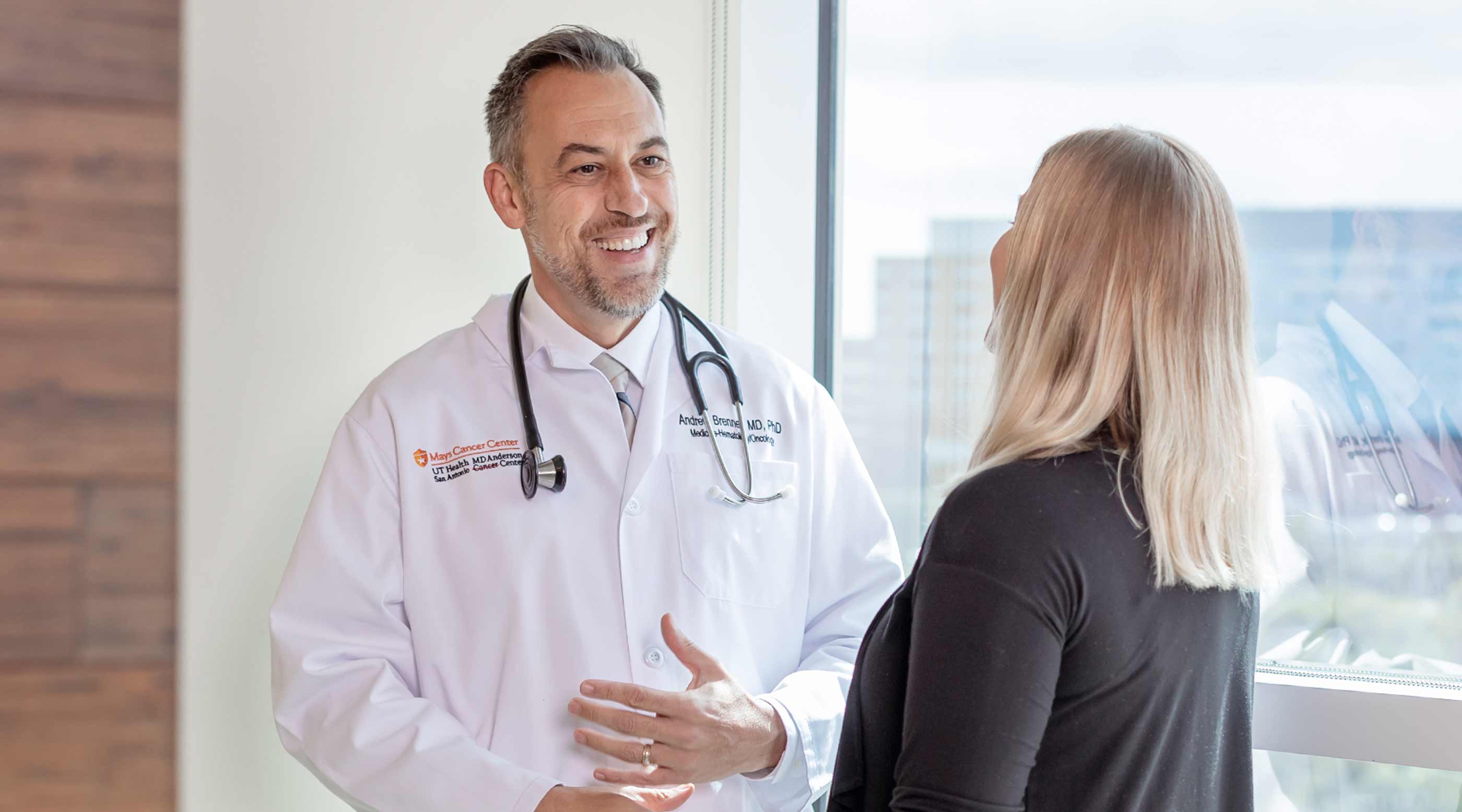

Andrew Brenner, MD
NOTE : If you're an existing patient, please connect via MyChart
-
About Me
About Andrew Brenner, MD
I have worked in experimental therapeutics with a focus on treatment of neuro-oncological and breast malignancies for 12 years. My earliest work focused on defining the role of p16(CDKN2A) in breast tumorigenesis and immortalization. After completing my clinical training in medical oncology, my laboratory efforts have shifted to developmental therapeutics in both breast and brain neoplasms. In regards to brain neoplasms, my work focused on alternate means of targeting the vasculature in glioblastoma that was not dependent on angiogenic signals directly. This led to a collaboration with Vascular Biogenics in which my laboratory established the activity of the anti-endothelial gene therapy, VB111, in preclinical models of GBM (for which I hold a patent but no financial stake). I was then principal investigator of the first in human study for advanced malignancies with this novel biologic which determined the recommended phase 2 dose, as well as a subsequent dual phase I/II study in recurrent GBM that showed a marked improvement in survival compared to historical controls. I served on the steering committee for the pivotal GLOBE trial, as well as led trial accrual across international sites. While the GLOBE study was negative, subsequent findings suggest bevacizumab (bev) interferes with VB-111 transgene expression, and a neo-adjuvant study is ongoing to address this. Given the role of hypoxia in antiangiogenic resistance, we also began working with hypoxia activated prodrug evofosfamide (Evo) for bev refractory GBM. Our team was able to establish a phase 2 dose with bevacizumab as both safe and promising based with early signals of efficacy. This led to our recently completed multicenter phase 2 trial of Evo with Bev at Bev progression, including characterization of hypoxia with 18F-MISO PET and metabolomics. We demonstrated a PFS-4 on Evo-Bev of 31%, a statistically significant improvement over the historical rate of 3%. We also found baseline hypoxic volume to correlate with PFS (HV; HR=1.67, P=0.009) and OS (HR=1.711, p=0.01), with subgroup analysis trending toward a decrease in HV (baseline to day 28) correlating with longer OS and PFS. I have been involved in the development of a number of new therapeutics. We developed a novel form of radiation therapy utilizing a unique chelator (BMEDA) to load nanoliposomes with beta emitting theragnostic 186Rhenium. The final investigational product, RNL186, is currently in a multicenter phase 1 study for which I am PI, with plans to progress to phase 2 in the coming months. I led not only the preclinical evaluation, but the entire IND enabling process including authoring toxicology studies, collaborating with the Nanotechnology Characterization Laboratory at the NCI for CMC evaluation, as well as authoring the clinical documents. In breast cancer, due to the observations of poor outcomes in our majority obese breast cancer population, we began collaborating with Linda deGraffenried at UT Austin on defining mechanisms for obesity induced endocrine resistance in hormone receptor positive breast cancer. More recently, we have been working on establishing FASN inhibition as a therapeutic strategy for endocrine resistant breast cancer. I am a clinical investigator and PI on multiple breast and neuro-oncology clinical trials including those with breast cancer brain metastases (Tucatinib[HER2Climb], ANG1005, Sacituzumab Govitecan[S2007], etc), and I also currently am Study Chair of two cooperative group studies (S1906 and S2007). I have been coleader for several years of our Experimental and Developmental Therapeutics Program of our recently renewed P30, and I have participated on numerous clinical advisory boards for putative neuro-oncologic drugs.
Gender
- Male
Languages Spoken
- English
- Italian

Andrew Brenner | Neuro-Oncology
You never know until you begin the studies how a human being is going to react to a new therapy, and we have to be very careful about how we proceed on that.
-
Credentials
Credentials
Positions
- Professor of Medicine - Research, Kolitz
Certifications
- American Board of Internal Medicine/Medical Oncology
- United Council of Neurological Subspecialties/Neuro-Oncology
Education
- Texas A&M University, College Station, Tx - BS, 05/1993, Biochemistry
- University of Texas at Austin and MD Anderson Caner Center Science Park - PHD, 05/1997, Tumor Biology
- Texas Tech Univ Health Science Center, Lubbock, Tx - MD, 05/2003, Medicine
- European Institute of Oncology, Milan - Postdoctoral Fellow, 08/1999, Cell Cycle and Breast Cancer
- Texas A&M University HSC Scott and White Hospital, Temple, Tx - Resident, 06/2006, Internal Medicine
- University of Texas Health Science Center at San Antonio, San Antonio, Tx, Fellowship, 06/2008, Medical Oncology
-
Locations & Contact
Locations & Contact
He is absolutely the best.
Patient
-
Research & Publications
Research & Publications
View all research & publications - Andrew Brenner, M.D., Ph.D
- Clinical Trials

 Close
Close
